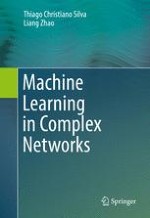2016 | OriginalPaper | Buchkapitel
10. Case Study of Network-Based Semi-Supervised Learning: Stochastic Competitive-Cooperative Learning in Networks
verfasst von : Thiago Christiano Silva, Liang Zhao
Erschienen in: Machine Learning in Complex Networks
Aktivieren Sie unsere intelligente Suche, um passende Fachinhalte oder Patente zu finden.
Wählen Sie Textabschnitte aus um mit Künstlicher Intelligenz passenden Patente zu finden. powered by
Markieren Sie Textabschnitte, um KI-gestützt weitere passende Inhalte zu finden. powered by
